Are you wondering how to fix hot water heater leaking rusty water? If so, you may need to replace the anode rod in the heater.
Hot water heater leaks impact the quality of your water, your plumbing system, and causes water damage to your home.
In this comprehensive guide, I will walk you through the steps to identify and fix a leaky water heater.
By the end of this article, you will be able to:
- Perform a water heater repair (if possible)
- Identify the source of the leak
- Prevent costly repairs and potential problems
- When to call a plumber to schedule water heater replacement
Tools for Leaking Hot Water Heater
Repairing a hot water heater can vary depending on the specific issue, type of water heater, and your level of expertise.
Below are some common tools that might be needed for different types of hot water heater repairs:
ScrewdriversAdjustable Wrencch
Pliers
Pipe Wrench
Multimeter
Voltage Tester
Pipe Cutter
Teflon Tape
Drain Pain
Flashlight
Remember, some hot water heater repairs can be complex and may require professional expertise, especially for gas water heaters, which involve working with gas lines.
If you are unsure about how to proceed or don’t have experience working with hot water heaters, it’s best to contact a qualified plumber or technician to handle the repair safely and effectively.
Safety Precautions before Beginning Repairs
Before you start repairing your hot water heater, it’s crucial to prioritize safety.
If you don’t know what you are doing, do NOT attempt a repair.
Signs of Water Heater Leaking
A leaking water heater can cause significant damage if left unattended. Here are some warning signs:
Puddles of Water
If you notice puddles of water forming around the bottom of your water heater, it’s likely leaking.
Moisture or Mold
Moisture around the water heater or mold growth indicates a slow leak.
Water Stains
Water stains on the ceiling or walls around the water heater can signal a leak.
Step 1: Turn Off the Power

If you have an electric water heater, locate your electrical panel and flip the breaker to the off position. This will shut off the power to your hot water heater.
Obviously, this step is crucial to prevent accidents and minimize the risk of further leaks during repairs.
Step 2: Shut Off the Cold Water Supply
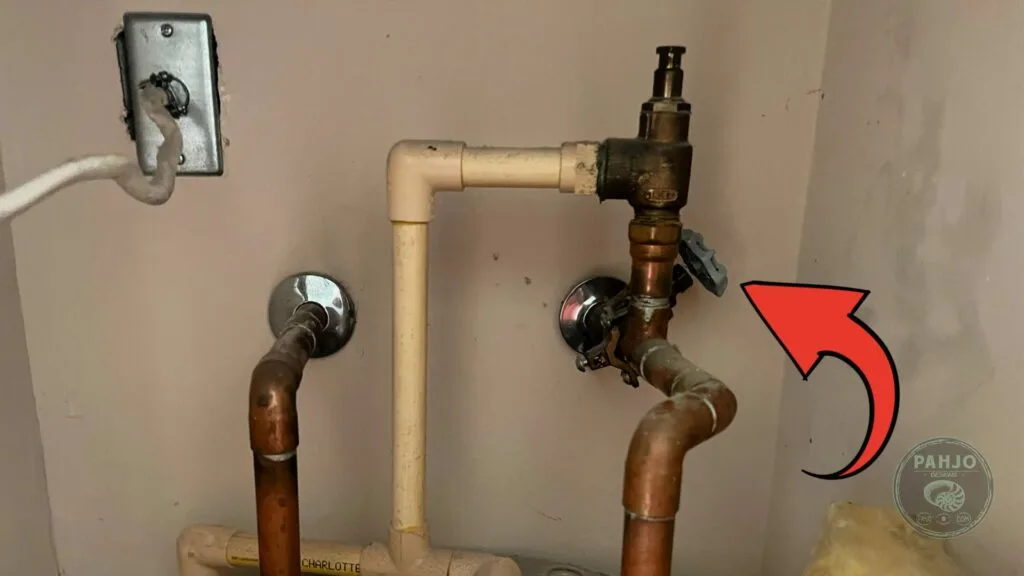
Next, shut off the water supply to the heater to prevent further leaking and damage.
Step 3: Locate the Leak
Identifying the Source of the Rusty Water Leak will help you determine the most effective repair approach.
First, identify where the water is coming from. The bottom of the water heater and top of the water heater are the most common areas to look for excess water.
Check for visible rust-colored water spots, leaks, or other signs of damage. This could be from the top, bottom, or the sides of the heater.
Step 4: Repair the Hot Water Heater
The most common repairs for a leaking hot water tank are:
- Flush and Drain the hot water heater to remove sediment
- Replace corroded or damaged pipes
- Replace the pressure relief valve (also known as TPR Valve) and drain valve
- Tighten leaky connections
- Replace faulty heating elements or thermostats
Flush and Drain Hot Water Heater
Flushing and draining your hot water heater can be done in a few simple steps:
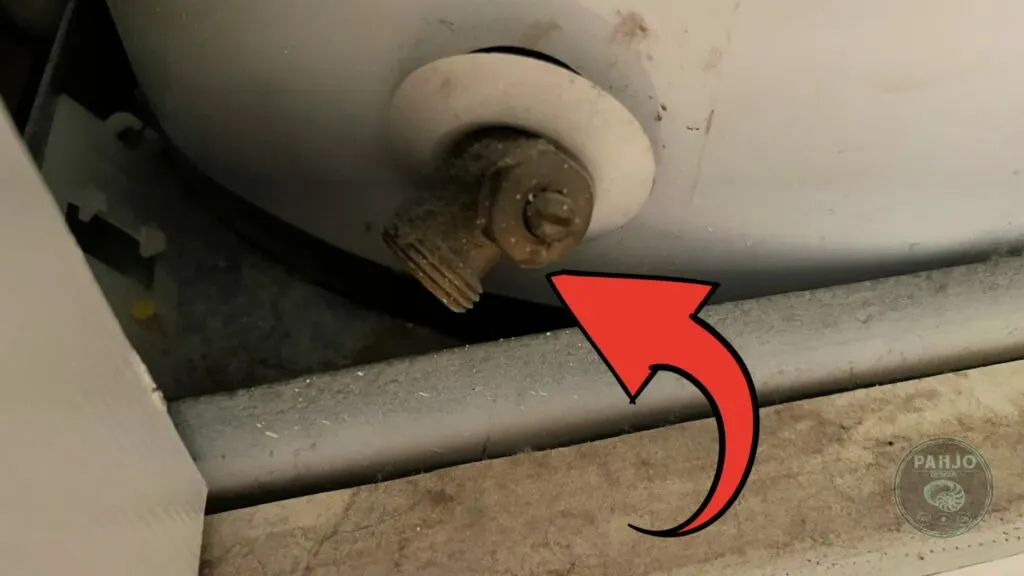
- Turn Off the Water Heater: If it’s electric, switch off the power from the circuit breaker. If it’s gas, turn the thermostat to “Pilot” setting.
- Connect a Garden Hose to the Drain Valve: The drain valve is typically located near the bottom of the water heater. Securely connect a garden hose.
- Direct the Hose to a Drainage Area: The other end of the hose should be directed to a suitable drainage area. Ensure it’s away from plants as the water may be very hot.
- Open the Drain Valve: Open the drain valve to allow the water to flow out. Be careful as the water will be hot.
- Open the Pressure Relief Valve: This can help the water drain faster. It’s typically located at the top of the water heater.
- Turn on Your Water Supply: Once the water heater is completely drained, turn on your water supply to flush out any remaining sediment. You’ll see clear water coming out of the hose.
- Close the Valves and Refill the Tank: Once the water runs clear, close the drain valve and pressure relief valve. Disconnect the hose and turn on the water supply to refill the tank.
If the problem seems beyond your skills, it’s time to call a professional plumber.
Step 5: Replace Hot Water Heater
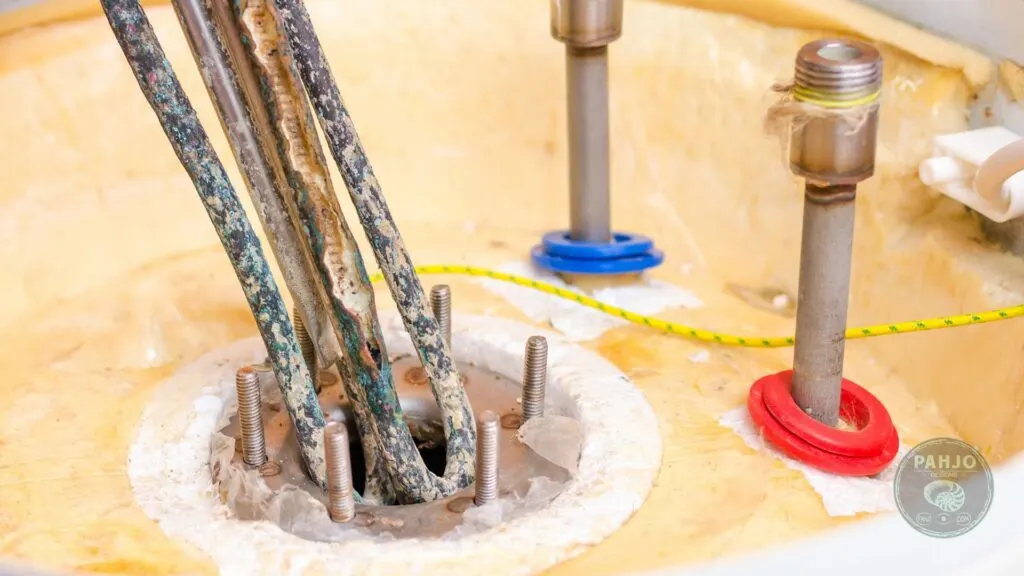
Depending on the severity of the issue, fixing a rusting or leaking water heater is not a viable option. As a result, replacement becomes necessary.
If your water heater is over ten years old, has severe corrosion, or is leaking from the water heater’s tank itself, it might be time for a replacement.
Understanding Water Heater Rusting
The most common factors leading to rusty water in a hot water heater are sediment buildup and rust corrosion within the tank.
Most Common Reasons Behind Water Heater Corrosion
Corrosion or rusting is a natural process that happens when metal comes in contact with water and oxygen.
In the case of water heaters, several components are made of metal and have direct contact with water, making them prone to rusting and corrosion.
Several factors contribute to the corrosion of your water heater.
Age
The lifespan of an average water heater ranges from 8 to 10 years. As it ages, the chances of rust and corrosion increase due to continuous wear and tear.
To determine the age of a hot water heater, you can look for the manufacturer’s label or serial number on the unit (refer to picture below).
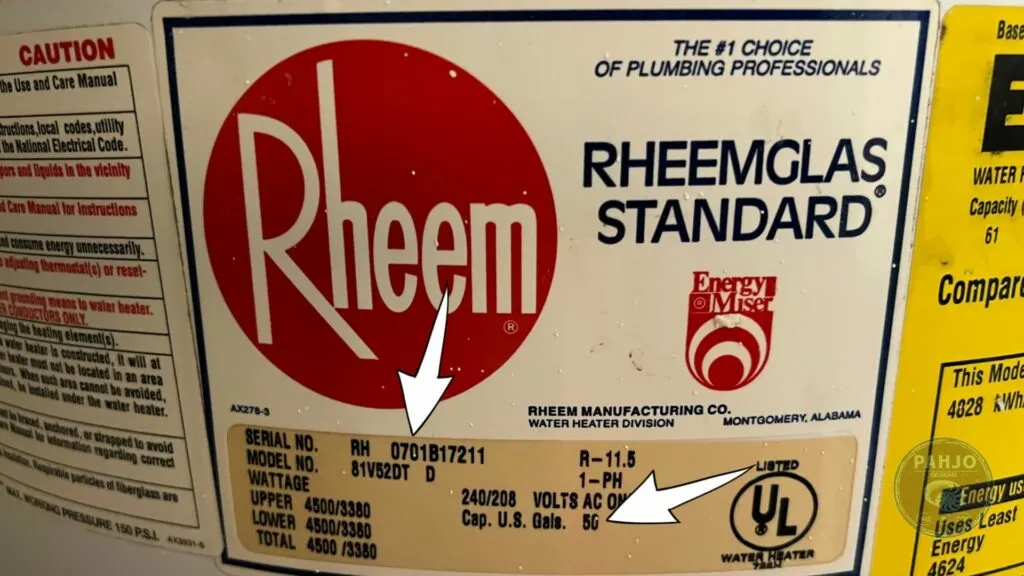
The serial number typically contains information that can help you identify the age of the water heater. Here’s how you can do it:
- Locate the serial number
- The serial number is usually located on a metal plate or sticker attached to the water heater. It can be found on the side of the tank or on the rating plate.
- Decode the serial number
- The format of the serial number can vary depending on the manufacturer, but it often contains information about the date of manufacture.
- The following is a general guideline on how to decode the serial number:
- Look for the first letter or two: Some manufacturers use a letter to indicate the month of manufacture.
- Find the next two digits: These digits typically represent the year of manufacture.
- For example, the water heater above was manufactured in July 2001.
- Check the manufacturer’s website
- If you’re having trouble interpreting the serial number or if it follows a different pattern, you can visit the manufacturer’s website or contact their customer support to get assistance in determining the age of the water heater.
- Consult a professional
- If you still can’t find the age of the water heater, you can reach out to a plumbing professional or a technician who can help you identify the age of the unit based on the model and serial number.
Water Quality
Hard water or water with high mineral content can accelerate the corrosion process.
Mineral deposits can build up in the tank, causing corrosion.
Sacrificial Anode Rod Failure
Anode rods are designed to attract corrosive elements, saving the tank from rusting.
However, over time, these rods can corrode, leaving the tank exposed and prone to rust.
Lack of Maintenance
Regular maintenance like flushing the water heater tank can keep corrosion at bay.
Obviously, neglecting such maintenance tasks can lead to a buildup of sediment, causing rust.
Recognize a Water Heater Rusting
Identifying rust in your water heater is crucial to prevent potential risks and damage.
Here are some signs to look for:
Discolored Water
Rusty or reddish-brown water is a clear indication of internal corrosion.
Metallic Tasting Water
A metallic taste in the hot water could indicate rust in the water heater.
Visible Rust
Rust on the exterior of the water heater, especially around the valves or the tank, suggests internal rust may also be present.
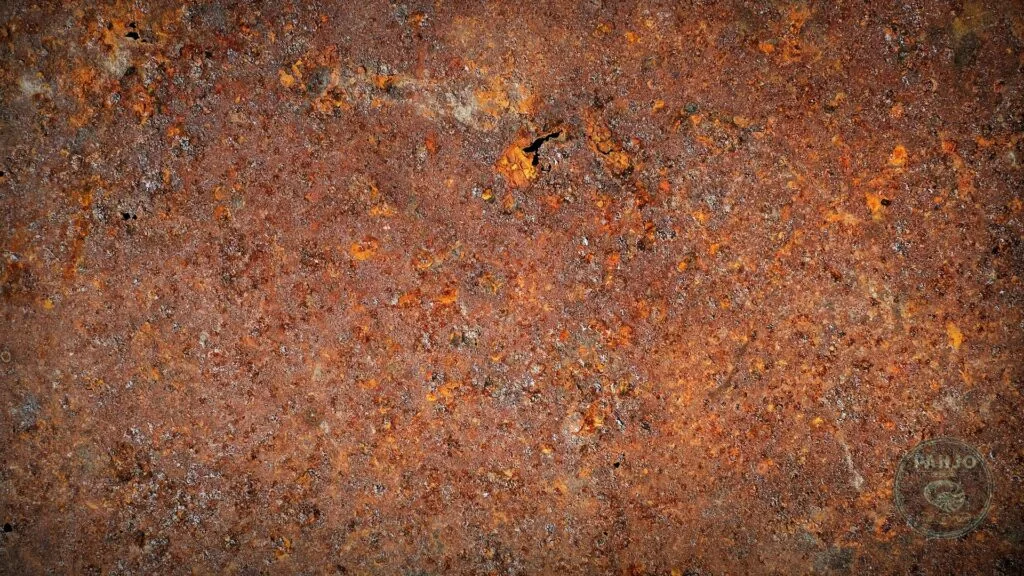
Routine Maintenance for Hot Water Heater
Regular maintenance is key to prolonging your water heater’s life and preventing rust water leaks.
Check the Anode Rod
Regularly inspect the anode rod and replace it if necessary.
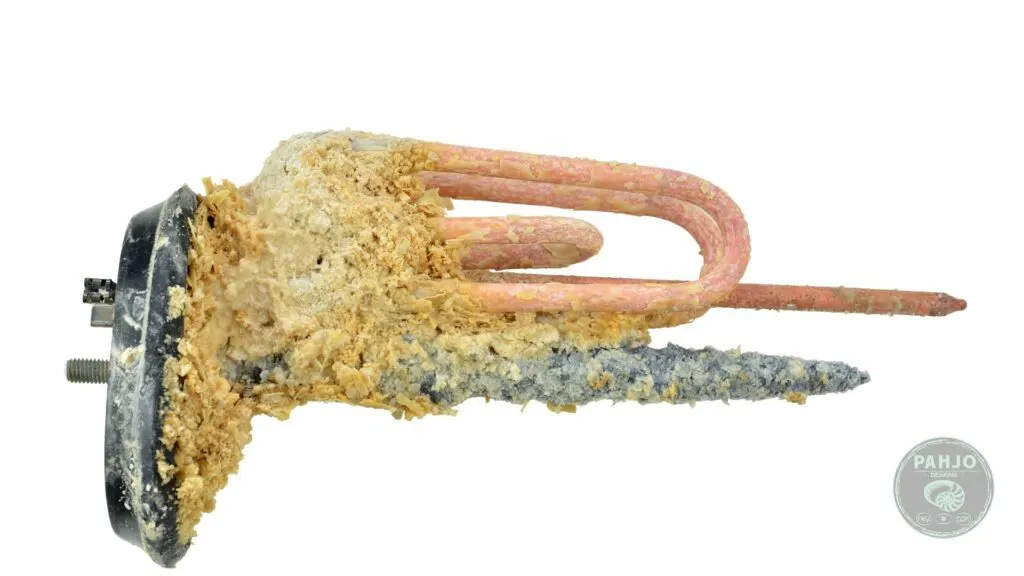
Flush the Tank
Drain and flush your water heater tank annually to remove sediment buildup.
Inspect Valves and Connections
Regularly check the valves and connections for any signs of rust or leaks.
Preventing Water Heater Rust and Leaks
Prevention is always better than cure.
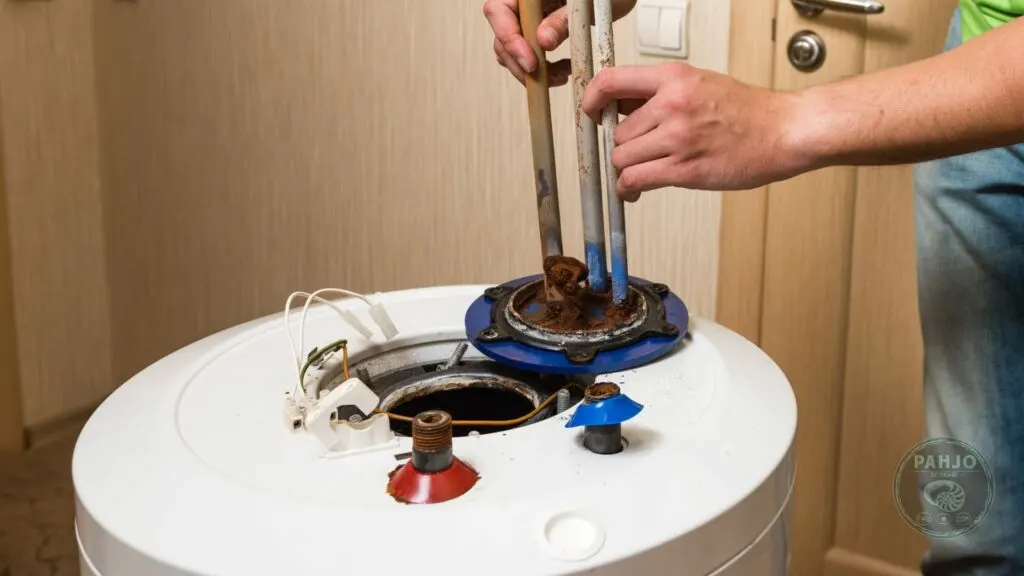
Here are some tips to prevent rust and leaks in your water heater.
Install a Water Softener
If your water supply is hard, consider installing a water softener to reduce mineral buildup.
Regular Maintenance
Also, regular maintenance can help identify potential issues before they become serious.
Replace Old Units
If your water heater is nearing the end of its lifespan, consider replacing it to prevent potential rust and leaks.
Choosing the Right Water Heater
When choosing a new water heater, consider factors like size, energy efficiency, and cost. It’s also important to choose a model suitable for your water usage patterns and budget.
- Type: Tank water heaters and tankless water heaters are the 2 choices. There are pros/cons to each, so be sure to do your research.
- Fuel Type: Choose a fuel type compatible with your home. Common options include electricity, natural gas, and propane.
- Energy Efficiency: Look for a water heater with a high energy factor (EF). Higher EF ratings indicate greater energy efficiency.
- Size: Choose a model with the appropriate gallons of water for your home. Consider the number of people in your household and your typical water usage.
- Cost: Consider both the initial and long-term hot water heater replacement cost. Energy-efficient models may cost more upfront but can save money over time.
- Warranty: Longer warranties typically indicate better quality. Ensure the warranty covers both parts and labor.
- Installation Requirements: Check if your home meets the installation requirements for the new heater. This includes factors like ventilation, space, and plumbing connections.
- Brand Reputation: Opt for a well-known brand with good customer reviews and reliable customer service.
Remember, it’s always best to consult with a professional before making your final decision.
Hire a Professional Plumber
Whether you need help fixing a leak, dealing with rust, or installing a new water heater, a professional plumber can provide the necessary expertise.
Look for a plumber with a good reputation, relevant experience, and fair pricing.
Conclusion
In conclusion, rusting and leakage in water heaters are common problems that can cause significant damage if left unattended.
By regularly maintaining your water heater, paying attention to warning signs, and hiring a professional when needed, you can keep your water heater in good shape for years to come.
Related Posts
- How to Fix a Cracked Mirror
- How To Fix a Toilet that Won’t Flush
- Cost to Paint Kitchen Cabinets
- How to Rust Metal on Purpose
- 15 Ways to Unclog Bathtub Drain
What are the steps to fix a hot water heater leaking rusty water?
This can be due to corrosion inside your heater. When the inner tank corrodes, the rust can mix with the hot water causing it to appear rusty.
How can I fix a hot water heater that’s leaking rusty water?
You might need to replace the anode rod in the heater. If that doesn’t work, the tank is likely too corroded and may need to be replaced.
What are the risks if I don’t fix my rusty water heater leakage?
If not addressed, rusty water can lead to more severe leaks, potential water damage, and the risk of bacteria growth in your hot water supply.
Can a plumber fix my hot water heater leaking rusty water?
Yes, a certified plumber can diagnose and fix the issue. It’s advisable to hire a professional to ensure proper repair.
How often should I inspect my hot water heater for rust or leaks?
Regular inspections every six months can help prevent rust and leaks in your hot water heater.
